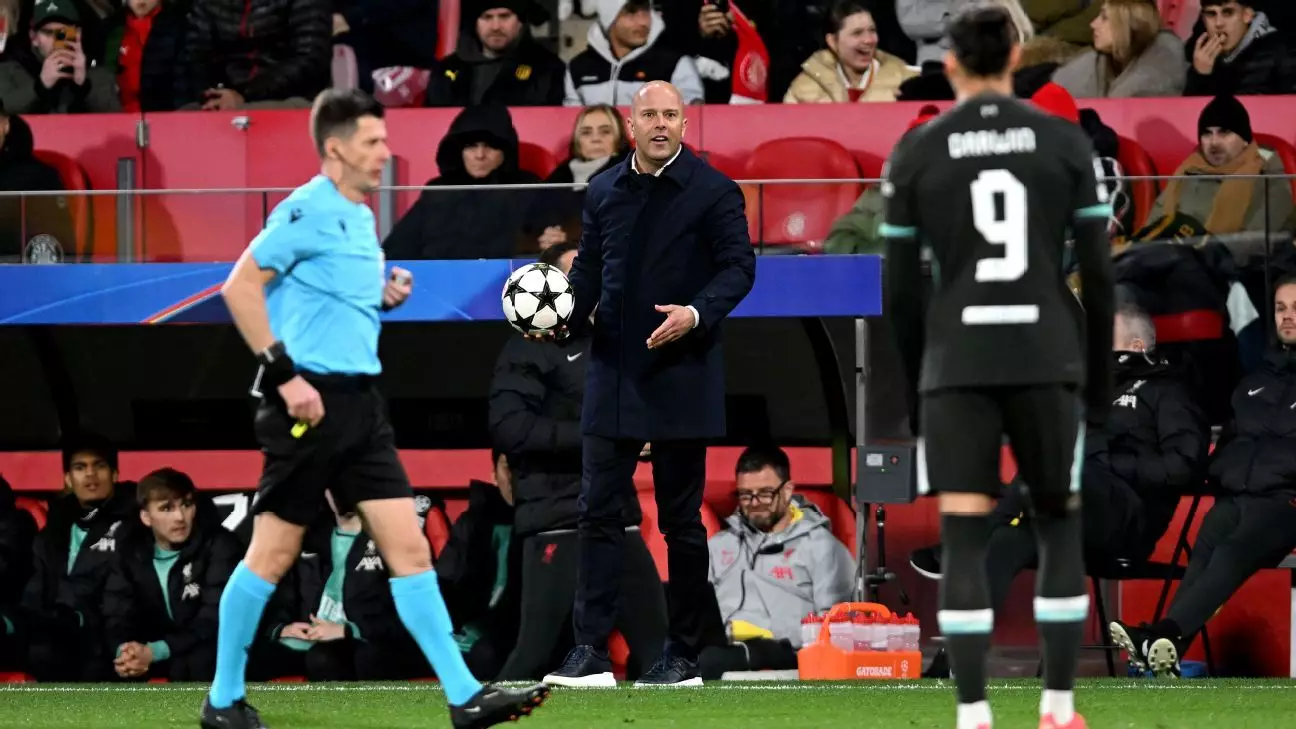Liverpool’s head coach, Arne Slot, finds himself in a peculiar position after his side’s narrow 1-0 win against Girona in the UEFA Champions League. While the victory extends Liverpool’s perfect record in the tournament—marking six consecutive wins—Slot’s post-match comments reveal a discontent with the team’s overall performance. Despite clinching the three points via a penalty from Mohamed Salah, Slot emphasized that the quality of play must elevate if the team harbors genuine aspirations for success in Europe’s elite competition.
The match played at the Estadi Montilivi exhibited a Liverpool side that appeared diminished compared to their usual high standards. The victory was secured through an uncharacteristically fortuitous penalty after Donny van de Beek’s foul on Luis Díaz—an incident that raised questions regarding the team’s attacking efficacy. While the results in this group stage are commendable, Slot’s critique calls attention to a significant imbalance between achievement and performance quality.
Slot articulated two key areas of concern regarding his team’s display against Girona. First and foremost was the level of intensity exhibited by the players. In previous encounters with elite clubs like Real Madrid and Manchester City, Liverpool had shown a knack for imposing their game through relentless pressing. Against Girona, this potency seemed lacking, suggesting that Liverpool might have underestimated their opponents. Slot’s assertion highlights a strategic mindset: even when competition appears subdued, maintaining intensity is non-negotiable.
The second major concern was the degree to which the players allowed Girona to bypass their pressing game. Slot’s critique serves as a reminder that the Champions League is fraught with challenges; underestimating teams—regardless of their prior performance—is a surefire way to create vulnerabilities. In Slot’s words, “if you are waiting to press and are so easily outplayed, this team can cause you problems.” This analysis encapsulates the unpredictability of the Champions League where any lapse can be devastating.
One silver lining for Liverpool was the much-anticipated return of Alisson Becker, a player Slot dubbed “the best goalkeeper in the world.” After a spell on the sidelines due to a hamstring injury, Alisson showcased his importance to the team with a series of crucial saves, preserving Liverpool’s fifth clean sheet in this year’s Champions League. Slot’s comments post-match reflected gratitude mixed with relief, indicating that the Brazilian has not only regained fitness but also reaffirmed his stature between the sticks.
Alisson’s return could not come at a better time, as his leadership and shot-stopping abilities are pivotal for a team that appeared to lack defensive solidity against Girona. In a season where performances can often swing based on individual brilliance, having a player of Alisson’s caliber functioning optimally can inspire confidence throughout the squad.
While Liverpool has enjoyed a successful campaign thus far, the spotlight also falls on striker Darwin Núñez. The Uruguayan forward endured a frustrating evening against Girona, missing several key opportunities. Slot’s comments regarding Núñez suggested that the player’s confidence may be wavering, though the coach aimed to mitigate pressure by highlighting the collective scoring capability within the team.
Núñez’s struggles present an intriguing conundrum for Slot. While his physical attributes and threat level pose formidable challenges for defenses, his conversion rate remains a concern. The coach’s belief in the player’s eventual return to form is crucial, but it also poses the question of whether Liverpool will need to adjust their approach to maximize Núñez’s effectiveness on the pitch.
As Liverpool moves forward in the tournament, the emphasis on improving performance becomes paramount. Slot’s candid admission of dissatisfaction serves as a vital indicator: no matter the achievements recorded, attention to detail, intensity, and consistency of performance will be essential in navigating the complexities of knockout rounds in the Champions League.
While the victory against Girona is a testament to Liverpool’s resilience and tactical acumen, it must also serve as a catalyst for introspection. Success in football is often a double-edged sword; the results can mask underlying issues that, if left unaddressed, can become detrimental in pivotal moments. With their sights firmly set on European glory, Liverpool must take heed of Slot’s wisdom and strive for greater heights.

